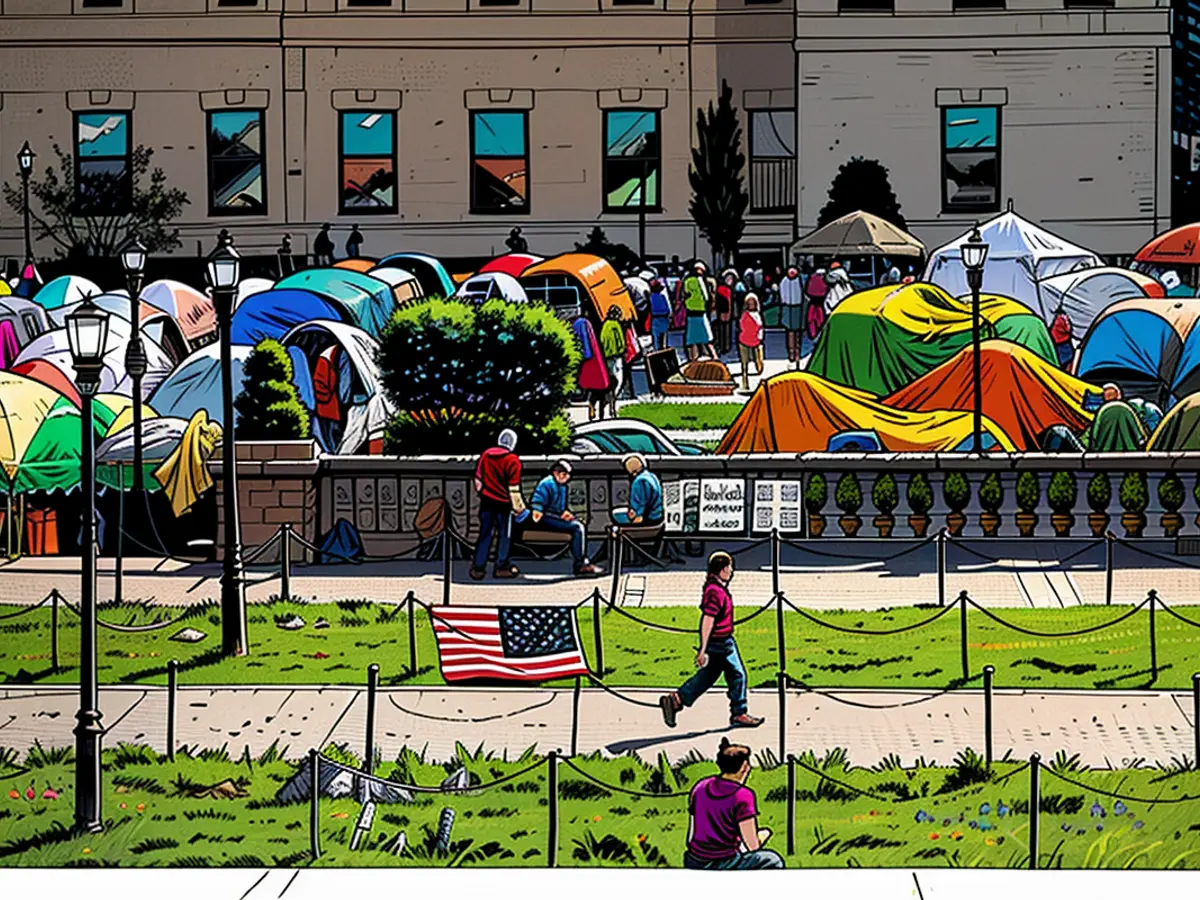Chaos on campus is far from over. Columbia’s president is just the latest shoe to drop
The resignation of Columbia President Minouche Shafik Wednesday was shocking, not because it was unexpected – it was a surprise that she survived so long, considering the mounting pressure on her to step down over the university’s poor handling of the campus protests last school year after Hamas’ deadly October 7 attack on Israel and the ensuing war in Gaza that has killed tens of thousands of people.
The astonishing part of Shafik’s announcement was the timing.
Shafik stepped down just as students were coming back to campus after a mostly quiet summer. The relative lack of protests on campus over the past couple months led many to believe that Shafik’s job was safe.
It’s unclear why she resigned now. Shafik, in a statement said the period took a “considerable toll” on her family. But she offered little explanation for why this moment, just as the school year was set to begin, was the optimal time for her to leave.
“It has been distressing—for the community, for me as president and on a personal level—to find myself, colleagues, and students the subject of threats and abuse,” Shafik said in the statement.
It hasn’t exactly been an uneventful summer for Columbia. Three deans resigned last week after the university investigated them for a series of text messages that Columbia said touched on antisemitic tropes. Columbia earlier in the summer had removed the deans permanently from their positions but opted not to fire them.
But compared to the campus demonstrations last school year – including encampments, protests, counterprotests, a takeover of a school building, a series of arrests, and a vastly scaled-back graduation ceremony – the past couple months have been calm.
Columbia is far from the only American university that struggled to determine how to react to the protests and allegations of rampant antisemitism and anti-Muslim activity on campus. The presidents of Harvard and the University of Pennsylvania also resigned over the past year following their disastrous testimonies in December before the House Education Committee, in which both former presidents failed to state affirmatively that calls on campus for the genocide of Jews would violate school rules.
Shafik, who was unable to testify at that same hearing, testified months later. Although she was more assertive in her condemnation of antisemitism on campus, many Columbia students believed her promises to crack down on peaceful demonstration against Israel’s devastating war in Gaza went too far, kicking off a series of large-scale protests that spread quickly to campuses across the country.
She became the fifth ivy League president to resign over the past year – the presidents of Yale and Cornell also stepped down, although the resignation of Yale’s former president came before the campus protests. Cornell’s former president mentioned the protests in her May resignation letter, but said she had already been planning to leave the role.

How we got here
Calls for Shafik to step down escalated after Columbia became the epicenter of pro-Palestinian demonstrations that spread to college campuses across the nation. The majority of demonstrators were calling for divestment from companies that support Israel and the war in Gaza and calling attention to the worsening humanitarian crisis in the enclave.
The departing Columbia president came under fire for authorizing the New York Police Department to arrest hundreds of protesters on the university campus in April.
A day after the encampment was launched on April 17, Shafik authorized the NYPD to arrest more than 100 protesters on a preliminary charge of criminal trespass. Following the first round of arrests, university faculty staged a walkout in support of students’ rights to peacefully protest.
Leading up to the university-wide commencement in May, a team of academic leaders enlisted by Shafik to negotiate with protest representatives failed to come to a resolution that would result in students leaving the encampment, Shafik announced in a statement on April 29.
The next round of arrests drew even more backlash. Around 300 protesters at Columbia and neighboring City College were arrested on April 30 after demonstrators barricaded themselves in Hamilton Hall, a main academic building on campus. Afterwards, Shafik was criticized for allegedly not allowing faculty members to step in and try to deescalate the situation before bringing police into the campus.
Columbia University members of the American Association of University Professors also drafted a censure motion alleging Shafik violated “the fundamental requirements of academic freedom” and launched an “unprecedented assault on students’ rights.”
People who urged the university to disband the encampments alleged that protesters had called for violence and physical intimidation targeting Jewish and pro-Israel students and faculty.
Meanwhile, many have said that student-run protests on campuses were predominantly peaceful and that outside agitators were fueling the unrest.
Nevertheless, the response to the nationwide movement was unrelenting. University leaders at dozens of campuses cracked down on protesters using arrests, sanctions and deferred diplomas. Since the initial arrests at Columbia, more than 2,400 people were arrested at more than 50 collegecampuses in at least 25 states, CNN data shows. Several universities also canceled classes and graduation ceremonies in the wake of the campus unrest.
Another point of contention was Shafik’s testimony to the House Education Committee on April 17 over the university’s handling of antisemitism.
In testimony she reportedly prepared for months, Shafik told lawmakers she condemned several professors’ statements made in support of Hamas’ October 7 attack, which left 1,200 people dead. It resulted in the firing of at least one professor, Mohamed Abdou, at the conclusion of the semester. She also told lawmakers that calls for the genocide of Jews violate the university’s code of conduct.
Several lawmakers found Shafik’s responses insufficient and pressed her on why more decisive and timely actions weren’t taken against professors as well as students who allegedly partook in acts of antisemitism.
New rules on campus and what the new year will bring
Israel’s deadly war with Hamas has escalated in recent weeks, and the situation in Gaza is increasingly dire. Antisemitism and Islamophobia are also surging across the world.
As the Israeli offensive that has killed entire families, deepened a humanitarian crisis, and turned cities into wastelands continues, the tensions that have reverberated across the globe will likely continue to bubble up across university campuses.
Over the past few months, several universities adopted new policies aimed at protecting students’ right to free speech while also maintaining order on campus and keeping people safe from hate speech and threats.
At Harvard, for example, two presidential task forces formed to recommend how Harvard can combat antisemitism and anti-Muslim, anti-Arab and anti-Palestinian activity urged the university to take a number of immediate actions. They outlined several ways Harvard can improve, including a transparent disciplinary process, promotion of dialogue and a series of trainings for staff and students.
Harvard also said it will no longer weigh in on public matters that don’t impact the Ivy League school’s core function.
Other universities outlined other similar new rules. But it’s unclear it will curtail protests during the new year.
It’s also unclear whether universities will respond differently to demonstrations in the new school year.
On Tuesday, a federal judge ruled that the University of California, Los Angeles cannot allow pro-Palestinian protesters to block Jewish students from accessing classes and other parts of campus, the Associated Press reported.
The preliminary injunction issued in California marked the first time a US judge has ruled against a university over the demonstrations.
A UCLA spokesperson said the ruling would “improperly hamstring our ability to respond to events” and the university is considering all available options moving forward.
CNN’s Matt Egan and Elisabeth Buchwald contributed to this report.
After the resignation of several deans due to antisemitic text messages, the business of managing controversy at Columbia University has once again come into focus.
The business of ensuring academic freedom and protecting students' rights to peaceful protest at Columbia University will continue to be a challenging task in the new academic year.








